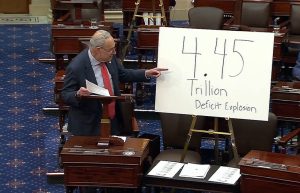The U.S. Senate entered an all-night session Sunday as Republicans push to pass President Donald J. Trump’s sweeping “One Big Beautiful Bill,” a massive legislative package promising historic tax cuts, deep spending reductions, and welfare reforms. The high-stakes debate comes amid fierce Democratic resistance and internal GOP unease, as party leaders race to meet Trump’s self-imposed July 4 deadline.
The bill narrowly cleared a key procedural hurdle Saturday following a dramatic standoff that required direct intervention from the White House. Several Republican senators wavered before phone calls from President Trump and a visit from Vice President JD Vance helped secure the votes needed to advance the legislation.
Senate Majority Leader Chuck Schumer criticized the Republican-led effort during the ongoing Senate session, accusing the GOP of misleading the public about the true fiscal impact of the legislation. “Democrats are showing on the floor through parliamentary inquiries the hypocrisy of what Republicans are trying to do here in the Senate,” Schumer said. “We’re exposing how Republicans are trying to hide the true cost of their billionaire giveaways from the American people. We’re demonstrating how they’re trying to pass the most expensive bill in U.S. history to give tax breaks away to billionaires while taking away Medicaid, SNAP benefits, and good-paying jobs from millions.”
Senator Bernie Sanders condemned the proposed legislation in sharp terms, calling it a moral and economic failure.
“It is obscene to give tax breaks to the top 1% by throwing more than 16 million people off health care, cutting nutrition for hungry kids, and making it harder for working-class young people to go to college,” Sanders said. “That is exactly what Trump’s budget reconciliation bill does.”
Senator Mark Kelly offered a blunt critique of the legislation during Senate debate, blasting its contents and impact on working Americans. “This bill is a shit sandwich—and not even the bread is any good. It’s a collection of the worst policies,” Kelly said. “It takes away people’s health care and food assistance, gives a giant tax cut to rich people, and adds trillions to our debt. Please tell me what is good about that.”
Dubbed the “One Big Beautiful Bill” by the Trump administration, the proposal promises to deliver wide-reaching changes to the tax code, eliminate taxes on tips, overtime, and Social Security income, and implement the largest spending cuts in modern U.S. history. The White House says the bill will cut over $1.7 trillion in government spending and result in take-home pay increases of more than $10,000 annually for typical working families.
Appearing on Sunday political shows, GOP lawmakers defended the legislation as a necessary overhaul of the federal budget and entitlement programs. Senator Markwayne Mullin (R-OK) called the bill “the largest deficit cut by any Congress in history.” At the same time, Senator Jim Banks (R-IN) highlighted the provisions to roll back Biden-era climate policies and enhance support for manufacturing.
Critics, however, warn that the bill could dramatically reshape federal support systems. Democratic leaders accuse the legislation of slashing Medicaid access, restricting SNAP (Supplemental Nutrition Assistance Program) eligibility, and undermining the social safety net. They argue that the tax benefits disproportionately favor higher earners and corporations.
In response, the Trump administration released a detailed “Myth vs. Fact” memo defending the bill’s provisions, insisting that Medicaid will remain protected for eligible Americans and that work requirements will apply only to able-bodied adults without dependents. The memo also emphasized the bill’s promise to bolster rural healthcare, expand child tax credits, and fund national defense, including missile defense and border security.
Economic projections released by the Council of Economic Advisers claim the bill could raise annual GDP growth by more than one percentage point, protect or create 7 million jobs, and reduce the national debt-to-GDP ratio by up to 29 percentage points over time. However, some analysts question those projections, and the nonpartisan Congressional Budget Office has not yet released its final score on the bill.
Several Senate Republicans have expressed concerns over the scope of spending cuts and the speed of the legislative process. Democrats have vowed to use procedural tools to delay or amend the package.
If passed, the bill would mark a cornerstone of Trump’s second-term economic agenda. If not, it could expose deep rifts within the Republican Party and raise new questions about the administration’s ability to govern with a slim Senate majority.
The Senate is expected to resume formal votes Monday evening. A final decision may stretch into the early days of July, with political stakes growing as both parties look ahead to the 2026 midterm elections.



